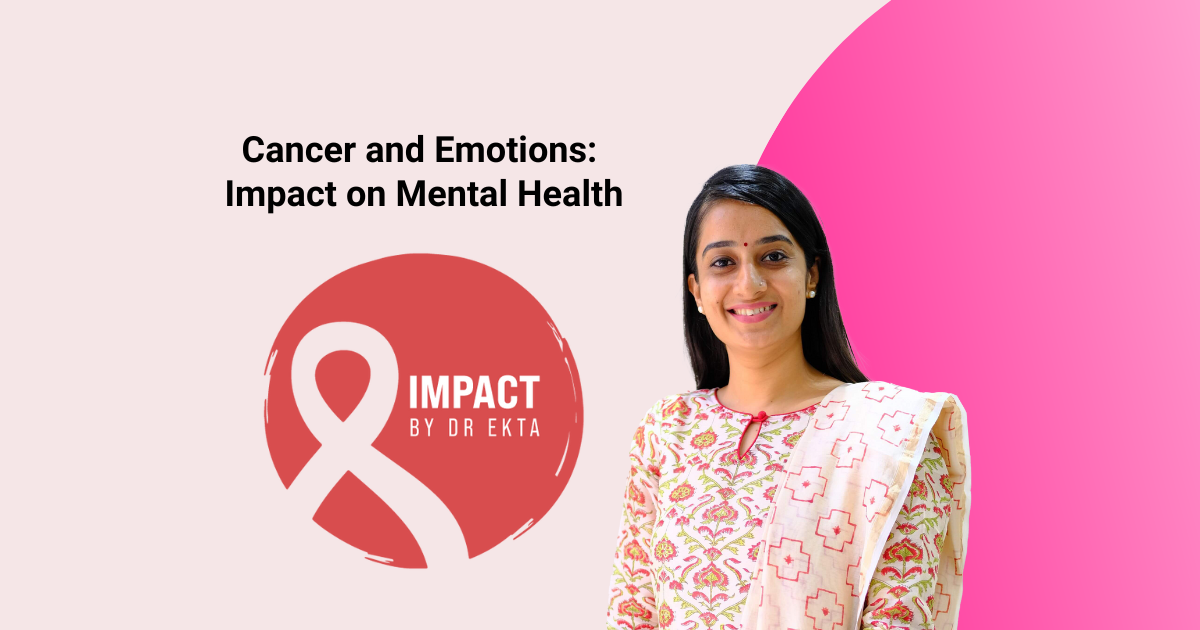Cancer is more than just a physical illness. It can significantly affect a person’s emotional and psychological well-being. The journey from diagnosis to treatment and beyond often triggers a wide range of emotions such as fear, sadness, anxiety, and anger. Understanding the connection between cancer and emotions is essential not just for the patient, but also for their caregivers and family members. In this blog, we will explore how cancer affects mental health, common emotional reactions, and effective ways to manage emotional distress during the cancer journey.
How Cancer Affects Mental Health
A cancer diagnosis can change every aspect of a person’s life. The emotional impact begins with the initial shock of diagnosis and may continue through treatment and into survivorship or end-of-life care.
Ways cancer impacts mental health include:
- Increased risk of depression and anxiety
- Fear of the unknown or cancer recurrence
- Struggles with body image after surgery or treatment
- Loss of independence due to physical limitations
- Financial stress related to medical bills and lost income
- Feelings of isolation, especially during long treatments
These challenges highlight the need to address both physical and mental aspects of cancer care.
Common Emotional Reactions to Cancer
Everyone experiences cancer differently, but certain emotional responses are very common among patients.
Some typical emotional reactions include:
- Shock and disbelief: Especially right after diagnosis
- Fear and anxiety: About treatment side effects, survival, or future
- Sadness or depression: Feeling hopeless or overwhelmed
- Anger: Directed at the disease, healthcare system, or situation
- Guilt: Especially if the person feels they caused the illness through lifestyle
- Loneliness: Feeling no one truly understands their struggle
These emotions are natural, but when they become overwhelming, they need proper support and management.
Mental Health Support During Treatment
Emotional well-being is just as important as physical treatment. Fortunately, there are various forms of mental health support available for cancer patients.
Support options include:
- Counseling or therapy: One-on-one sessions with psychologists or counselors
- Support groups: Sharing experiences with others going through similar challenges
- Medication: Antidepressants or anti-anxiety medications when prescribed
- Mindfulness practices: Yoga, meditation, and breathing exercises
- Spiritual care: Support from chaplains or spiritual advisors
Hospitals and cancer centers often have in-house support services. Ask your oncologist about mental health professionals who are part of your care team.
Emotional Support for Family and Caregivers
Cancer doesn’t just affect the patient. Family members and caregivers also deal with emotional strain.
Caregivers may experience:
- Stress from managing appointments and medications
- Worry about the patient’s condition
- Feelings of helplessness or guilt
- Burnout from balancing caregiving with other responsibilities
Caregivers should also seek emotional support. Many cancer centers offer counseling for family members and host caregiver support groups.
Managing Emotional Well-Being During Cancer
Taking small steps each day can help cancer patients feel more in control of their emotions.
Healthy ways to manage emotions include:
- Talking about feelings: With a therapist, family member, or trusted friend
- Keeping a journal: Writing down thoughts can be therapeutic
- Maintaining social connections: Even short conversations can uplift mood
- Engaging in physical activity: Helps reduce stress and boost endorphins
- Setting daily routines: Adds structure and predictability
- Listening to music, reading, or art: Creative outlets ease emotional tension
Patients should never feel ashamed for needing mental health support. It’s a vital part of overall healing.
When to Seek Professional Help
While occasional sadness or stress is normal, ongoing emotional distress can become a serious mental health concern.
Signs you should seek professional help include:
- Persistent sadness or hopelessness
- Loss of interest in daily activities
- Trouble sleeping or eating
- Panic attacks or extreme anxiety
- Thoughts of self-harm or suicide
If you or someone you know shows these signs, contact a mental health professional immediately. Early intervention can lead to better outcomes.
Role of Oncology Psychologists and Social Workers
Cancer care teams often include trained mental health professionals such as:
- Oncology psychologists: Experts in helping patients cope with emotional effects of cancer
- Psychiatrists: Can prescribe medication if necessary
- Licensed counselors or therapists: Offer talk therapy
- Oncology social workers: Help navigate emotional, social, and financial challenges
These professionals collaborate with doctors to provide holistic care.
Online and Community-Based Resources
Patients who live in remote areas or prefer privacy can also access online emotional support services.
Helpful resources include:
- CancerCare: Offers free counseling and support groups
- American Cancer Society: Provides educational materials and local support
- National Cancer Institute: Evidence-based info on managing emotional health
Look for local community centers, religious organizations, or hospitals that may offer emotional support services as well.
Final Thoughts: Addressing Cancer and Emotions Together
Understanding the connection between cancer and emotions is key to improving overall patient outcomes. Emotional health is not a luxury it is a necessity. From the initial diagnosis to life after treatment, managing emotions plays a critical role in quality of life.
If you or a loved one is facing emotional struggles related to cancer, don’t hesitate to seek help. Talk to your oncologist, reach out to support groups, and explore therapy options. Healing is not just physical—it is mental and emotional too.
Need guidance on emotional support for cancer? Contact our care team or call us at 08866843843

